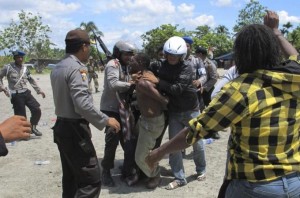By Kathryn Maureen Ryan
Impunity Watch Reporter, Managing Editor
MONROVIA, Liberia – As the death toll continues to rise in West Africa’s deadly Ebola virus outbreak several counties have taken steps to prevent the spread of the virus in an effort to prevent the spread of the deadly illness. To date the virus has killed more than 1,200 people in four West African countries; Guinea, Liberia, Nigeria and Sierra Leone.

So far Liberia has been the worst affected of the four West African countries hit by the Ebola virus, with 576 deaths from 972 cases to date. Officials have sealed of the West Point Slum in Monrovia, an area that is home to 75,000 people, in an attempt to stop the spread of the Ebola virus. However, the quarantines have angered residents who say the forced curfews and quarantines came with no advanced warning of the measures which has prevented them from being able to buy and store food and water.
Some residents had begun throwing rocks at police who were enforcing the quarantine. The police responded by firing live rounds and teargas into the crowd. Police also reportedly beat some of the residents. While several serious injuries were reported no-one is reported to have been killed during the incident.
Liberia’s President Ellen Johnson Sirleaf, defended the quarantines, which have been established in areas throughout the country, saying they were essential to control the spread of the disease. She argued that Ebola had continued to spread throughout the country because of “continued denials, cultural varying practices, disregard for the advice of health workers and disrespect for the warnings by the government”.
However, there are fears that large scale isolation will lead to unrest in quarantined communities when essential movement of goods and people is cut-off. “I don’t have any food and we’re scared,” said Alpha Barry, a West Point resident. The World Health Organization has begun working with local authorities to deliver emergency food aid into quarantined zones in an attempt to prevent rising unrest.
The World Health Organization, which has set up a task force to monitor and contain the Ebola outbreak, has advised countries affected by the Ebola virus outbreak have been asked to introduce exit screenings at all international airports, seaports and major land crossings in order to stop the spread of the disease. The WHO task force will also be responsible for providing information to governments as well as transport companies. “Any person with an illness consistent with [the Ebola virus] should not be allowed to travel unless the travel is part of an appropriate medical evacuation”, the UN health agency said. It added that non–affected countries in the region “need to strengthen the capacity to detect and immediately contain new cases.”
Several governments have already taken steps to restrict travel from West African countries effected by the Ebola outbreak. Kenya Airways announced that it will suspend flight operations to Liberia and Sierra Leone. The Kenyan government announced other restrictions, saying it is temporarily suspending entry into Kenya of passengers who have passed through Sierra Leone, Guinea and Liberia. The government of Cameroon has closed all its borders with Nigeria, which has had at least 4 deaths due to the virus, in an attempt to halt the spread of the Ebola virus, state radio said on Tuesday.
For more information please see:
Al Jazeera – Liberia Overwhelmed By Number of Ebola Dead – 21 August 2014
The Wire UK – Ebola: Police Open Fire to Enforce Liberia Quarantine – 21 August 2014
Reuters Africa – Cameroon Says Closes Borders With Nigeria in Bid To Halt Ebola – 20 August 2014
USA Today – Ebola Toll Climbs Even Amid ‘Encouraging Signs,’ WHO Says – 19 August 2014
The Wire UK – Ebola: WHO Calls For Screening at Borders in West Africa – 19 August 2014
CNN International – New Restrictions in Kenya for Travelers amid Ebola Fears – 16 August 2014
Centers for Disease Control and Prevention – 2014 Ebola Outbreak in West Africa – August 2014
.jpg)

